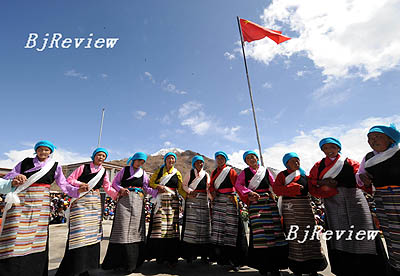|

Violent crimes involving beating, smashing, looting and burning have occurred in Lhasa, capital of Tibet Autonomous Region, and neighboring Qinghai, Gansu and Sichuan provinces in mid-March. Sufficient evidence shows that the riots were organized, premeditated, masterminded and incited by the Dalai Lama clique. For example, the Tibetan Youth Congress, a hardline organization under the Dalai Lama's supporters that openly preaches violence, made a statement on March 10 this year saying that they would fight for "the independence of Tibet" defying death and sacrifices.
The Dalai Lama said on many occasions that he had given up his commitment to "Tibet independence." In his latest appeal to the Chinese people, he said he had "no intention to split Tibet from China or cause a drift between the Han and Tibetan peoples." The reason, as Melvyn C. Goldstein, an American anthropologist and Tibetology scholar, explained in his 1999 book The Snow Lion and the Dragon, is that the Dalai Lama's strategy is to garner as much support from the United States and European countries by continually accusing China of human rights abuses. The success of the Dalai Lama's strategy is built on the fact that he hopes the current Chinese Government would collapse as China's Qing court (since 1644) did in 1911 and the Soviet Union did in 1991, and Tibet would consequently become independent, Goldstein said.
But the reality is, after 30 years of reform and opening up, today's China enjoys continuous political and social stability, extensive ethnic unity, a booming economy and rising international status. It is just daydreaming to wait for the nation to crumple and "Tibet independence" to be achieved.
Our surveys show that Tibet has made remarkable progress in political, economic and cultural fields since the region launched the Democratic Reform in 1959 and installed the system of regional autonomy in 1964, and especially after the country initiated the reform, opening-up and modernization drive in the late 1970s. A majority of the Tibetan people are now able to fully exert their rights as the master of their destiny and enjoy the equal political status as people of other ethnic groups in the country. Their livelihood has been improved constantly. Most of them feel satisfied with their present life and state policies toward Tibet, which does not resemble the Dalai Lama's description that "Tibetans in Tibet have been living in a state of constant fear."
On the contrary, a growing number of the Tibetan people, residents in rural and pastoral areas in particular, have begun to worry more and more about the sabotage activities by a small fraction of secessionists. The recent riots in Lhasa have gone against the will of a majority of Tibetans as well as the Buddhist doctrine of love that has been cherished by the Tibetan people for generations. What Tibetans fear most is the resumption of the pre-1959 feudal serfdom in Tibet and terrorist activities of "Tibet independence" forces.
"As a fellow human being and as someone who is prepared to consider himself a member of the large family that is the People's Republic of China, I appreciate and support President Hu Jintao's policy of creating a harmonious society," said the Dalai Lama in an open letter to the Chinese people. If he really means what he says, then he should stop and voice his opposition to all the splittist activities and violence.
The 4 million Tibetan population should decide the future and destiny of the Tibetan ethnic group. Due to their increasingly improved living conditions over the past decades, people of various ethnic groups living in Tibet and other Tibetan-inhabited areas have already chosen the road toward a modern socialist society. Democracy, freedom, harmony and prosperity are what they pursue. |
